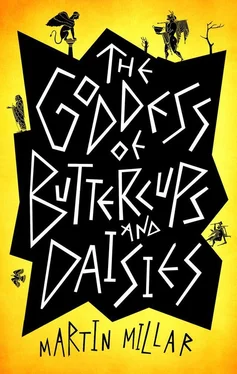It was not the sort of challenge his companions could ignore. After an hour or so of heavy drinking, the room was in uproar, and Aristophanes was feeling a lot better about life. He flung his arm round Socrates’ shoulder.
‘You’re not a bad chap, Socrates. Much too keen on lecturing people about philosophy, but you did fight well at Delium, and you can drink a reasonable-sized cup of wine. Talking of which, why are our goblets empty? Bring more wine! Stronger this time!’
‘Is that really a good idea?’ said Socrates.
‘Who’s symposiarch, you or me? Bring more wine!’
Aristophanes laughed as the aged Leucon, so-called comic poet, fell off his couch.
‘Ha. Can’t take his wine like us, Socrates. We’re old soldiers. We’re tough!’
Aristophanes noticed Callias was looking a little displeased. He had no idea why.
‘Perhaps it’s time for a pause in the proceedings,’ said their host. ‘I think it’s time for some entertainment.’
One end of the room had been cleared, to act as a stage. There was a fancy embroidered curtain as a backdrop, and from behind it stepped a surprisingly beautiful young woman. She carried a flute, and smiled cheerfully as she emerged.
Callias looked puzzled. ‘I don’t remember hiring her. Where’s my secretary?’
The secretary was lying drunk under a couch, unable to keep up with the company. He wasn’t the only one. Aristophanes kept sending the wine round, and several guests were finding it difficult to maintain the pace.
Two actors, newcomers to the party, shouted at Callias.
‘Can she play the flute?’
‘Let her play anyway! She’s beautiful.’
‘If you like that sort of thing.’
Metris began to play. Even though many of the guests were by now rather the worse for wear, it was soon obvious that she was a talented performer. Not only that, there was something about her that seemed to radiate good cheer. Aristophanes found himself tapping out the rhythm with his feet. His garland of flowers fell off. He jammed it back on and began to dance.
Laet had informed Idomeneus that if he wanted to earn some extra money, there was now a price on Aristophanes’ head. Euphranor was offering a reward. She didn’t say how she’d learned this, but Idomeneus assumed she’d something to do with initiating it. He accepted the offer. He’d never been poor since travelling with Laet, but he wasn’t wealthy either. He used to be, centuries ago, and he still remembered that.
Before they parted he asked Laet if she needed anything. She shook her head. She rarely needed much. She wasn’t that demanding a woman. She ate little, quickly became bored by luxuries, and apparently had no sexual desire. She often preferred to remain silent for long periods. Despite their long association, Idomeneus didn’t really know what motivated her. He knew she liked to ruin other people’s lives. She’d been doing that for eight hundred years, but she’d never offered him any sort of explanation. Perhaps the semi-divines didn’t need the same sort of motivations that humans did.
For most of that time, Idomeneus of Crete had been her bodyguard. Or servant, perhaps, though that’s not how he liked to think of himself. He’d been a military leader, back in his natural life span. He didn’t serve anyone. But when a man had his life extended by such an amount, he was prepared to do a few things he’d rather not do.
Last week Idomeneus had killed two men who’d tried to waylay them on their way to Athens. He ran each of them through in an instant. He’d never lost his fighting skill. Afterwards he couldn’t understand why the robbers had thought they could attack them.
Why did they think they could rob me? I wouldn’t say I looked like an easy target. Perhaps they were driven on by Laet’s beauty. Maybe they thought they could take her as a prize. Fools.
Or perhaps Laet made them do it. When she extended her powers, people did act in ridiculous ways. It might have been her idea of a treat for her bodyguard. She knew he liked to see action every now and then.
Idomeneus had learned that Aristophanes had been invited to a symposium at Callias’s house. He took directions and made his way there, though progress was slow. The night was dark and he had to conceal himself several times from the groups of Scythian archers who policed the streets at night. As an alien in the city, he knew they’d be suspicious of him, large and heavily armed. He finally made it to the street with the statue of Apollo holding a flute. He knew he was close to Callias’s mansion and settled down to wait. At some point Aristophanes was going to emerge, and Idomeneus was going to kill him.
When the girl finished playing her flute there was a lot of applause, and a lot of laughter at those individuals who, moved to dance but too intoxicated to keep up, had collapsed on their couches, or underneath them. Aristophanes’ mood had transformed. Why was he worrying? He was the best comic dramatist in Athens. He was the best poet. He wrote the funniest scenes. Was anyone going to defeat him in a contest? Let them try.
‘I can beat any man here at cottabus!’ yelled Eupolis.
Aristophanes wasn’t going to decline a challenge like that. ‘I’ll take you on!’ he roared.
Cottabus was a popular after-dinner game. Players had to fling the dregs of their wine at a small statue, attempting to knock it from its perch so it fell into a saucer below. They did this while reclining on their couches. After an evening of drinking, it could be a challenging task. On Callias’s orders servants bustled in, setting up the stand with the tiny statue on top.
‘Watch this!’ cried Aristophanes, in the general direction of Socrates. ‘It takes a fine eye and a steady hand to win at cottabus. If you’re a dramatist of unusual skill, that helps too.’
Aristophanes made short work of Eupolis, knocking the statue from its perch with deadly aim while his opponent flailed around hopelessly.
‘Much as he does in the theatre!’ yelled Aristophanes, very amused. Nicias was too statesmanlike to play, but General Lamachus was always up for a challenge. He put up more of a fight but Aristophanes saw him off too, before scoring another fine triumph over some young man he hadn’t been introduced to, a lover of Callias’s, possibly. He was a good-looking youth. Far too good-looking for Callias, thought Aristophanes, but when you were as rich as he was, you could buy all the handsome lovers you wanted.
Aristophanes was looking round for more opponents when he was interrupted by a voice he’d rather not have heard.
‘And now, our special entertainment of the evening — lyric poetry from Athens’ favourite up-and-coming young poet, Luxos!’
Luxos, having introduced himself, appeared on the small stage, holding his cheap lyre.
‘I know I didn’t invite him,’ said Callias. ‘Aristophanes, is he a friend of yours?’
‘I’ve never seen him before.’
‘Throw the scoundrel out!’ cried Eupolis. But Callias, full of wine and keen to recline after dancing far too vigorously for a man of his age and bulk, didn’t seem to mind.
‘Oh, let him recite, I need a rest anyway.’
Luxos’s youthful face lit up. Against the odds, he’d succeeded. He was finally going to be able to recite his poetry to an influential audience. Aristophanes chuckled. Luxos was a young scoundrel, but if he was willing to make that much effort, perhaps he deserved his chance. As his female companion looked on, rather adoringly, people noticed, Luxos began to recite:
Immortal meadows of many-coloured flowers
welcome in their embrace —
Читать дальше












